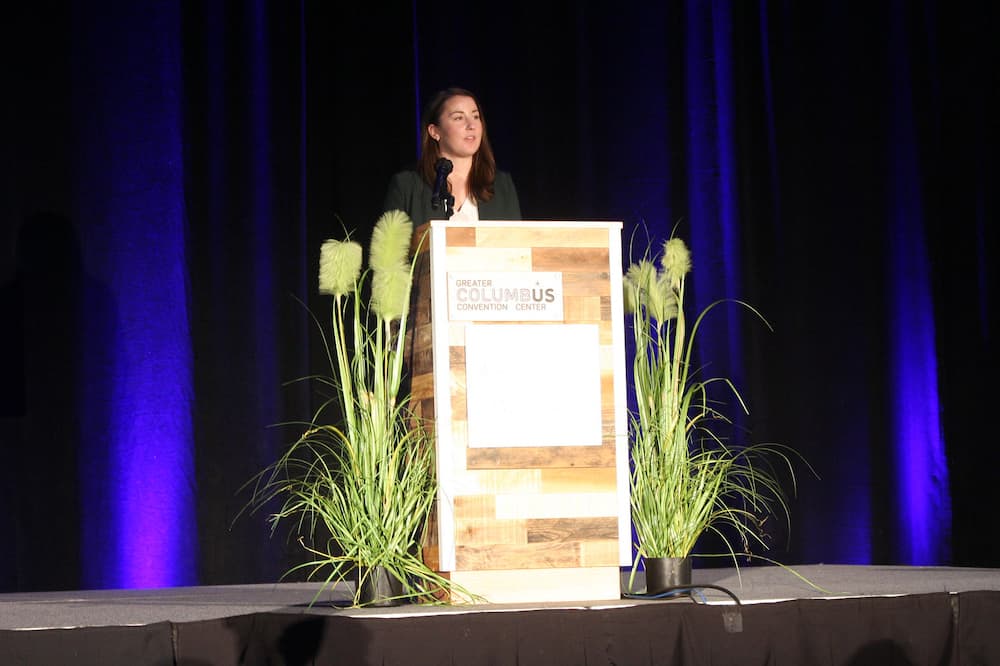
[Image above] Elizabeth Nagel, Corning plant engineering manager, talks about the role Corning Valor Glass played in meeting the demand for glass vials to distribute the COVID-19 vaccine. Credit: ACerS
While the need for sustainable manufacturing practices is a perennial topic in industry, the COVID-19 pandemic hastened discussion of this topic in the public realm.
For glass manufacturers, this discussion offers the perfect opportunity to position glass to play an integral role in climate change pledges made at the 26th United Nations Climate Change Conference of the Parties. And as evidenced by talks last week at the 82nd Conference on Glass Problems (GPC), the glass industry is more than ready to jump on this opportunity.
GPC is the largest glass manufacturing conference in North America, and it is coorganized by The Glass Manufacturing Industry Council (GMIC) in partnership with Alfred University. The annual conference aims to provide a platform for leading experts and manufacturers to share information on new innovations and methods to deal with the industry’s problems manufacturing glass.
Like many conferences last year, GPC moved to a virtual format for 2020. But this year, GPC welcomed 357 attendees to the Greater Columbus Convention Center on Nov. 1–4, 2021.
“It was wonderful to see everyone back in Columbus. You could tell everyone was happy to be together again,” says GMIC executive director Bob Lipetz. “The glass manufacturing industry has faced quite a bit of adversity these past two years, but they are resilient and continue to find ways to provide society with essential glass products. The organizers of the 82nd Conference on Glass Problems were just as determined to see that the conference was held in person this year, and it was a success by many measures. The quality of the GPC and symposium programs was at an all-time high. Exhibiting was robust and the networking events were popular.”
The conference began Sunday night with a GPC Advisory Board Dinner. On Monday, Nov. 1, attendees had the chance to attend a short course titled “Advanced Fundamentals of Batch and Furnace Operations” taught by C. Philip Ross, president of Glass Industry Consulting International. Additionally, students participated in a plant tour of Owens Corning Newark.
The plenary talks on Tuesday kicked off with an overview of the United Nations International Year of Glass (IYOG), which will be celebrated in 2022. Speaker Manoj Choudhary, adjunct professor of materials science and engineering at the Ohio State University, expressed excitement for the opportunity IYOG presents to raise awareness of how glass benefits society. He pointed attendees to the acersmain.wpenginepowered.com/iyog webpage for more information on events taking place in the United States and Canada to celebrate IYOG.

One way glass benefits society is through pharmaceutical tubing and vials. This topic received much attention during the conference due to the increased demand on the pharmaceutical packing industry arising from COVID-19 vaccine distribution. Elizabeth Nagel, Corning plant engineering manager, and Robert Schaut, Corning scientific director, each gave talks on this topic, with a particular focus on the role Corning Valor Glass played in the current pandemic and how it will help mitigate future supply chain shortages.
Raising awareness of glass’s benefits comes with challenges, however, according to O-I chief sustainability and corporate affairs officer Randy Burns. In his plenary talk, he discussed some of the misinformation and misrepresentation concerning sustainability of glass that is happening in popular media, and he concluded that talking about the benefits of glass will not be enough to change behavior. Instead, he urged attendees to “nudge” the public toward glass use, such as by implementing glass recycling and collection programs in local communities.
Air Products in Allentown, Pa., is one long-time GPC exhibitor who excels in supporting such “nudges.” Each year, the Air Products Foundation donates to The Ceramic and Glass Industry Foundation (CGIF) and GMIC to foster innovation by the next generation of ceramic and glass professionals. According to Marcus Fish, director of development for the CGIF, the $15,000 donated by Air Products this year is invaluable. “With all of the challenges we’ve been facing these last 18 months, this donation enables us to do outreach to inspire the next generation of glass and ceramic professionals,” he says in a CGIF press release.

In addition to educating the public on glass, several talks focused on gaps in knowledge faced by glass manufacturers and offered solutions. For example, J. Terry Fisk, senior scientist and owner of JTF Microscopy Services, discussed how more glass manufacturers are relying on outside firms for their refractory bricks and do not have in-house knowledge of the materials. He provided a brief overview of the types of materials used to fabricate bonded alumina–zirconia–silica refractory bricks. Several talks also looked at the possibility of hydrogen as a fuel source in glass manufacturing and described challenges that the industry will need to consider.
A special symposium organized by GMIC on “Automation in Glass Manufacturing” took place Thursday, and it provided a detailed examination of sensors, industrial artificial intelligence, data analytics, controls, remote management, and other automation tools invaluable to efficient sustainable glass manufacturing.
The 83rd Conference on Glass Problems will take place Oct. 31–Nov. 3, 2022, in Columbus, Ohio. Abstract submissions are open until Jan. 14, 2022, at 9 p.m. Eastern.
To view more photos, visit our Flickr.
